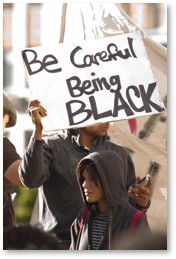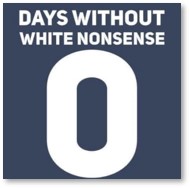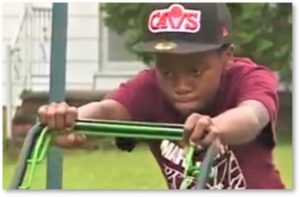Lately we have seen a barrage of calls to 911 lines from white folks reporting that people of color are in their proximity and doing something the caller deems suspicious. Not that those people are actually doing something wrong, mind you. Usually they are just going about their lives, doing the things white people do every day without eliciting comments from anyone. It’s called Living While Black.
I understand why it’s happening—and why it’s happening more right now. You would have to be living off the grid or with a pack of wolves to miss the signals that  tell white people it’s okay to overreact when a person of color does anything at all. They also think its all right to patrol the pool, the park, the yard, or the neighborhood in search of black people who might possibly, potentially, theoretically, be doing something that offends white sensibilities. Like breathing, eating, playing, doing yardwork, running, exercising, cooking, etc.
tell white people it’s okay to overreact when a person of color does anything at all. They also think its all right to patrol the pool, the park, the yard, or the neighborhood in search of black people who might possibly, potentially, theoretically, be doing something that offends white sensibilities. Like breathing, eating, playing, doing yardwork, running, exercising, cooking, etc.
A case of this actually occurred in 2009 in Cambridge when a white woman reported that a black man was breaking and entering the house next door. The man was a Harvard professor—Henry Louis Gates—and he was coming home to his own house. The aggressive police response to him entering his home became a national controversy.
Living While Black
That was then. Now Living While Black happens seemingly every day. In the New Yorker recently, Kashana Cauley provided a list of 14 reasons why people called the authorities on persons of color this week. You gotta be kidding me. What a bunch of snowflakes.
The call that struck me as most offensive was the woman in Cleveland, Ohio, reporting a 12-year-old black boy for mowing her neighbor’s lawn. Gee, I though that a bigoted white woman would:
- Be happy the kid was working.
- Be reassured that he was doing the kind of menial work she probably thinks is appropriate for anyone black.
- Be amazed that Reginald Field and his cousins were doing something constructive. At 12, the boy has his own mowing company and employs his cousins. That’s ambitious.
But no. She thought the kid had accidentally cut part of her lawn—and that merited a call to the police.
Who Does That?
Okay, that’s outrageous enough. As the news media said: Who does that? To act this prickly, you have to be the kind of busybody who looks out the window all day hoping to see something go wrong so you can complain about it. When I was a kid every neighborhood seemed to have one peeking through the lace curtains. I would expect, however, that the police would know who they are. Their calls should elicit eyerolls at the station and someone with good people skills talking her down.
The thing that really astonishes me, though, is that the police responded at all. Why do they? With all the problems and demands they have to deal with, why would the police waste their time and resources on something as silly as this? Plus, we know that whenever a patrol car and armed officers show up at the scene, things escalate. We need to avoid spark, now more than ever.
My Version of the Call
 Were I the police dispatcher, the call would have gone something like this:
Were I the police dispatcher, the call would have gone something like this:
- Woman: There’s a black boy out here cutting grass!
- Dispatcher: Yes, Ma’am. Please state the nature of your problem.
- Woman: I just said! He cut some of my grass by mistake.
- Dispatcher: It’s not illegal to cut the grass, ma’am.
- Woman: Well, no. But I didn’t ask him to cut my grass.
- Dispatcher: Then it was a mistake. Did the boy damage your lawn, ma’am?
- Woman: No, he didn’t. But he cut the grass.
- Dispatcher: Then I’d say you got a freebie, ma’am. Why don’t you offer him some money to finish the job?
- Woman: Are you going to send a car or what?
- Dispatcher: No, ma’am. Our officers have more important things to do.
And that would be the end of the story.
But no. The patrol car came and the scene made the national news. Something good did come out of it, however. People all over the city were so distraught by the situation that they began calling to offer work for Mr. Reggie’s Lawn Cutting Service. Members of the community were appalled and bought Reginald Field a new lawn mower and leaf blower. So now he has more business than he can handle and is better equipped to do it. Good for you, Reggie.
Taking Living While Black Calls Seriously
But really, why do the police take these Living While Black calls seriously?
- In April, a white woman in Akron, Ohio, called to complain that two black men were barbecuing with a charcoal grill, an appliance that had been banned in the area. Police responded.
- In May, a woman called the police to report that a black girl was taking a nap in the common area of her residence hall at Yale University in Connecticut. The police responded and demanded she show proof that she was actually a student.
- In May, a black real estate investor in Memphis, TN was working on an estimate for repairs on a house when an Hispanic woman called to report that he was doing something suspicious—even after he showed her documentation to support his work. The police responded and, to their great credit, supported him completely.
- In June, a white woman in San Francisco called the police to report that an eight-year-old black girl was “Illegally selling water without a permit” in front of her store. The girl was trying to raise money to go to Disneyland. The police did not respond and the woman later said she only pretended to call them. The girl got free tickets from a sympathetic reader.
And that’s just a few. There are many, many more.
Inquiring Minds Want to Know
There are three common factors in Living While Black: the callers are mostly white, mostly female, and typically angry. Don’t ask me to explain this. I am white and female and it would never occur to me to call the police in any of these situations. But, then, I’m not angry.
The other factor is that they remain anonymous. We learn the names of the people who have the police called on them even though they are doing nothing wrong. Sometimes we learn the names of the responding officers. We rarely learn the names of the meddlers who cause the problem in the first place. They get to make trouble but stay nameless, unless someone outs them on social media.
are doing nothing wrong. Sometimes we learn the names of the responding officers. We rarely learn the names of the meddlers who cause the problem in the first place. They get to make trouble but stay nameless, unless someone outs them on social media.
This should stop. We need to know who the real troublemakers are and the news reports should tell us.
So, let’s hear a caller’s name as part of the Living While Black report. After all, if a woman is willing to go on the record with the police station, she should have no problem with the public knowing who she is. Is she not proud of her action? If not, she has no business picking up the phone in the first place.

